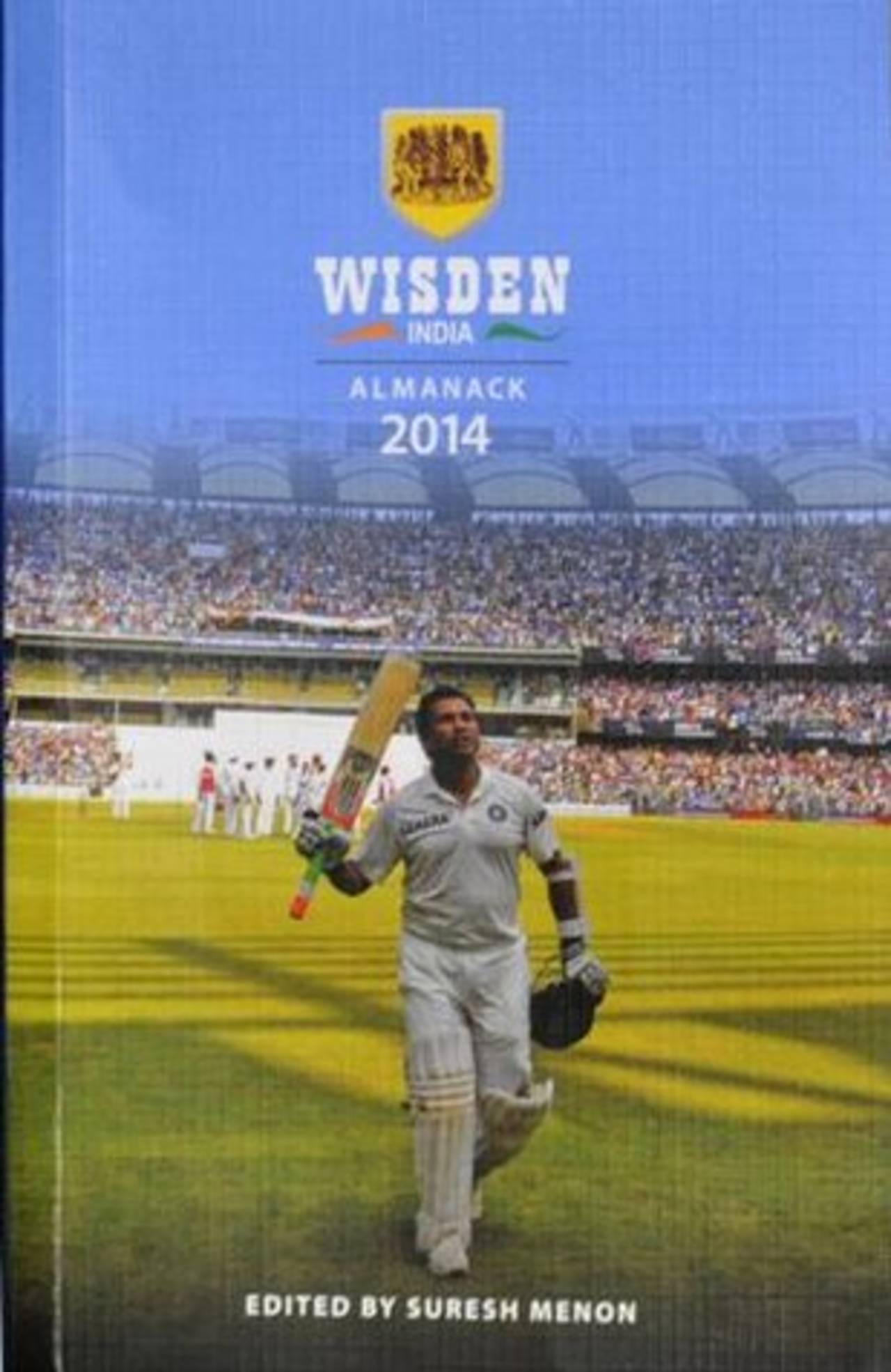Farewells and remembered pleasures
Goodbyes to Tendulkar and others, delightful essays and detailed recaps - the 2014 edition of the Indian Wisden has plenty to treasure
Soumya Bhattacharya
05-Apr-2014

Its inaugural edition in 2013 coincided with the publication of the 150th edition of its big daddy, the Wisden Cricketers' Almanack. And now here is the second edition of the Wisden India Almanack, its 2014 cover kitted out in its already familiar blue and white.
On the cover is a photograph of Sachin Tendulkar walking off the Wankhede turf in his farewell Test, stepping into the shadows as he walks beyond the latticed squares of sunlight and shade on the ground, the standing, cheering crowd a blur of colour in the background, Tendulkar with his right arm holding his upraised bat, helmet in his left, looking upwards, walking away.
It is an iconic photograph, one that every Indian cricket fan can conjure up in his mind's eye in an instant. And yet, on seeing it in print on this cover, I cannot but be again overwhelmed by all those powerful emotions that swamped us on that humid November day in Mumbai. That cover sets the tone for the delectable array of offerings in this volume.
The period under review, Suresh Menon tells us in his "Notes by the Editor", is June 2012 to September 2013. But Tendulkar's decision to retire in his 200th Test in Mumbai in November 2013 meant that a special section on India's greatest sporting legend had to be accommodated. The book is better off for this. A Wisden India Almanack, being published in April 2014, would have been infinitely worse off without a valedictory wave towards the man who as much shaped the game during his career as was the poster boy for the world's most populous democracy.
In "His Last Bow", the section dedicated to Tendulkar, Jaideep Varma and Soham Sarkhel do a nifty job in assessing the master's impact in numbers. My favourite: the list of five highest-impact Test performances. This is actually two lists. One set comprises impact measured in terms of the particular Test, and the other in terms of the series. In terms of a series, Tendulkar's 193 against England in Leeds clocks in at No 1. With respect to a particular Test, the 136 against Pakistan in Chennai in 1999 - regardless of India losing the match - is top of the list.
Angus Fraser remembers playing against Tendulkar in the Old Trafford Test of 1990. And Mike Coward perceptively elucidates the unique relationship that Australia had - and continues to have - with Tendulkar. Only Narendra Pani's essay about how Tendulkar's story is entwined with India's story of growth and change and his being appropriated by the country for a host of non-cricketing reasons offers nothing original. Off the cuff, I can recall Mike Marqusee, Ramachandra Guha and this reviewer having written about the matter at some length years ago.
Essays lie at the heart of every Wisden Almanack. The ones in here do not disappoint. Marqusee opens the section with a delightful piece on the particular joys of cricket watching: the distinctive manner in which the game treats time and space, and how the desires it satisfies "belong to everything about us that is all-too-human".
Mudar Patherya had me nodding in agreement and amusement. His essay, which begins as an enchanting recollection of Kolkata's tradition of watching and talking about cricket, finally ripple-dissolves into how, because of the sheer amount of cricket being played nowadays, "while we may be watching more, we are remembering less".
Tariq Ali's mordant playlet illumines the brief section devoted to fiction around the game.
Tendulkar justly gets a section to himself. But there is another, titled "Farewell", in which tributes are paid to three modern greats who retired in the period on which the book focuses. Peter Lalor writes movingly about Ponting and Hussey; and Ed Smith comes up with a masterful analysis of the career of his contemporary, Andrew Strauss, and the unusual and unexpected turn Strauss' cricketing journey took.
For India fans (and I would assume that India fans will be most drawn towards a Wisden India Almanack), the match reports, detailed scorecards and series recaps offer much remembered pleasure. The period under review was one in which India did well on the field: the Champions Trophy win and the 4-0 blanking of Australia at home being for me the highlights of that phase.
It might seem churlish to pick on this, but it would be remiss of me to not point it out. (Merely one tiny example: look at the opening sentence of p 684.) Menon exhorts us in the penultimate paragraph of his editor's notes to be gentle with an error when we spot it. I shall be gentle and not much labour the point.
Wisden India Almanack 2014
Edited by Suresh Menon
Bloomsbury India
927 pages, Rs 699

Edited by Suresh Menon
Bloomsbury India
927 pages, Rs 699

Soumya Bhattacharya is the editor of Hindustan Times, Mumbai, and the author ofYou Must Like Cricket? and All That You Can't Leave Behind. He tweets here